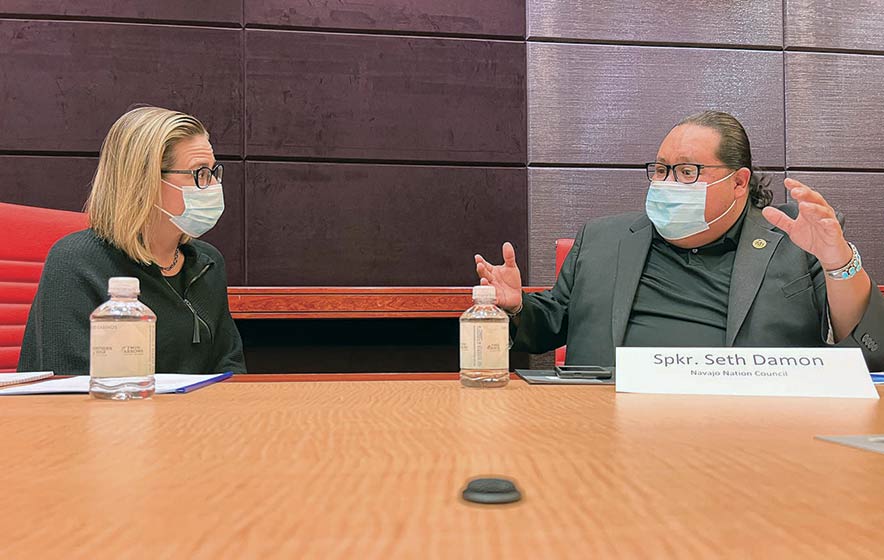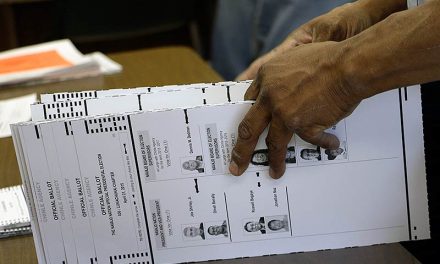
Sen. Sinema zeroes in on Diné priorities
BÉÉSH HÁÁT’I’-TSIIZIZII, Ariz.
U.S. Sen. Kyrsten Sinema, D-Ariz., says it is her goal to get the $1.2 trillion infrastructure funding into projects that need them across the state, including Diné Bikéyah.
“As quickly as possible,” Sinema said in a meeting April 11 with Diné lawmakers at Twin Arrows Navajo Casino Resort.
“It is my intention to work hand in hand with the (Navajo Nation) to ensure that every dollar of federal funding – that the Nation can access – gets into the hands of employees,” Sinema said, “as well as your employers, and into the stewardship of the Nation as quickly as possible.”
President Joe Biden signed the Infrastructure Investment and Jobs Act on the White House lawn on Nov. 15.
The package, which delivers critical components of Biden’s agenda, makes investments in the country’s deteriorating roads, bridges, airports, water systems, and ports of entry and will expand access to broadband internet in urban centers and remote areas of the state.
“I’m really proud of this legislation because I think it shows what we can accomplish when elected leaders are willing to ignore extreme rhetoric and political attacks,” said Sinema, who co-brokered the deal with Sen. Rob Portman. “Instead, focus our energy on delivering lasting results that matter to people all across our nation.”
Diné priorities
Speaker Seth Damon presented Sinema with a list of challenges and priorities as a guiding tool because of time constraints.

Navajo Times | Krista Allen
U.S. Sen. Kyrsten Sinema, D-Ariz., and Speaker Seth Damon talk about the Navajo Nation’s priorities during a meeting with Diné lawmakers at Twin Arrows Navajo Casino Resort on Monday afternoon in Béésh Háát’i’, Ariz.
The six-page list comprises 12 items: the Navajo Nation’s COVID-19 response plan, transaction privilege tax, community and economic development, education, public safety, social services, health care, natural resources, veterans, transportation, and tribal-state relations.
Tódinéeshzhee’ Delegate Nathaniel Brown added a few other priorities, including water rights, language, and voting rights.
Brown said the water settlement doesn’t pertain only to the Navajo-Hopi Little Colorado River and the Navajo Utah water rights settlements but also to the area between Tsébii’ndzisgaii and Tsé Nitsaa Deez’áhí, where water is needed.
“There’s a total of $256 million that we would need, and we want to invest our own funding,” Brown said. “So, there’s $209 million that’s sitting there. This is to combat the drought and plant our own food – from a garden to a farm to cafeteria projects.
“Getting our people back to working and eating healthier,” he said.
Brown asked Sinema to support drafting an Indigenous language bill that would support U.S. Sen. Jon Tester’s efforts to help preserve Native American languages.
Brown also expressed his disappointment at Indigenous voting rights.
“In the state of Arizona, we have nine legislations that would do away with our voting,” Brown said. “That is our voice, and that is our elders’, children’s voices that are being taken away. That’s how we feel about the voting rights act.
“One of the great things my community has done is thinking outside the box,” Brown said. “We know how the federal and Navajo government is slow in response, so we created a nonprofit called ‘Nááts’íílid Initiative.’
“We’re going to be building homes for our working-class Navajo citizens,” he explained. “We know that HUD gives funding for that, but the federal clause that really irks me is that people have to be below the federal poverty income guideline. So, our nonprofit is responsible for changing that in the sweat equity program.”
Brown added many other priorities, including the Missing and Murdered Indigenous Relatives issue, human trafficking, and climate change.
Central Delegate Kee Allen Begay Jr. said the highest priority in the Navajo Nation is economic development.
“The nation and the Navajo Nation can help the state of Arizona attract more visitors because we have several monuments in the Nation – Canyon De Chelly, Monument Valley, Four Corners, and the Grand Canyon,” Begay said. “There’s a lot we’re able to provide.”
Begay mentioned other priorities needing immediate improvements, such as postal service and Hopi Route 60, a 13-mile dirt road connecting Low Mountain and Polacca.
“With the help of the state and former Arizona Sen. Carlyle Begay, (they) have helped secure funding from the state level,” Kee said. “But we do need more funding for that particular road.”
Kee’s list of priorities includes a smart highway – a catch-all term for how technology is incorporated into the road – from Sanders to Four Corners.
“Establishing that as a smart highway would be very beneficial,” Begay said. “Of course, there would be more connection of travelers in our community.”
Delegate Otto Tso said another major priority is relocating Diné families affected by the former Bennett Freeze.
What happens next?
Sinema said the next step is to identify the top-list projects on the Navajo Nation’s backlog and advocate directly with the Office of Management and Budget to ensure that these projects get prioritized with funding.
“One example: I just had great success with Winslow, where the Winslow Levee Project received full funding after the passage of my infrastructure law,” Sinema said in an interview with the Navajo Times. “I was there for that and to make sure it gets implemented quickly.
“That’s also what I want to do with the Navajo Nation,” she said, “but it is my goal to collaborate with leadership to ensure that they prioritize what’s most important for the Nation.”
Sinema said it is her job to grapple with the federal government so that it gets done efficiently and effectively.
Sinema said Monday was her first visit to Twin Arrows, where she tried a Navajo Fizz from the Navajo Blue Travel Plaza.
She said the Infrastructure Investment and Jobs Act invests $110 billion to build significant highways projects and repair bridges and roads, including rural roads throughout Arizona and the rest of the country.
“Our bipartisan infrastructure law represents the single largest dedicated bridge investment since the construction of the interstate highway system,” Sinema said. “So, all these years later, this is the largest investment we had.
“We also secured $3.5 billion for the Indian Health Service Sanitation Facilities construction program, specifically targeted for water infrastructure and resiliency,” she said. “My team has worked with the Nation to identify backlog projects on the Nation. Part of what I want to do is work with you carefully and closely to prioritize those projects.”
Sinema added she secured over $700 million for hydropower production and efficiency incentives for capital improvements relating to maintaining and enhancing hydroelectricity generation.








 Highway 264,
Highway 264, I-40, WB @ Winslow
I-40, WB @ Winslow